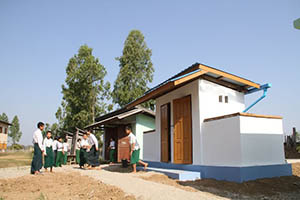
The upland areas of Myanmar are largely populated by non-Bamar ethnic groups; each state and region is diverse in terms of its people, languages and culture. The Chin are of Sino-Tibetan origin and inhabit a mountain chain which roughly covers western Myanmar through to Mizoram in north-east India and small parts of Bangladesh. Combined with the difficulty in accessing the area; the living conditions of Chin State continue to degrade due to lack or inadequate support to its population.
Chin State remains the poorest state among 14 regions and states in Myanmar with seventy three per cent of the people below the poverty line. The 2015 floods affected 20,449 people in Chin State, 4.3 per cent of the total population. The damage spanned across 9 townships in the state, causing widespread damage to households and basic infrastructure in the region. The Myanmar Post-Disaster Needs Assessment of Floods and Landslides report determined Chin State had the second highest (behind Rakhine State) number of affected households in the region, with 3,987 homes either collapsed or destroyed during the floods, and of these households 2,934 requiring relocation.
UN-Habitat, supported by the Government of Japan, will assist vulnerable ethnic communities of Chin State on constructing community infrastructure, increasing access to safe drinking water and reconstructing housing badly affected by the 2015 floods, this will be possible with the kind grant contribution of JPY 607,000,000.
The proposed project focuses on empowering communities to ensure they will jointly work to build or renovate quality basic services and housing to give targeted population basis for healthy and productive life. The project is framed within the overall objective of helping Myanmar’s ethnic poor and vulnerable communities to address the emergency needs to restore their normal life and to sustainably improve quality of life. The project will be implemented in 200 villages across Hakha, Tedim, Falam and Thatlang townships.
The project will contribute to the policy priority under the Framework for Economic and Social Reform (FESR) of effective implementation of people-centered development to improve health and living standards of the poorest of the poor and most vulnerable. Moreover, it will support the Government of Myanmar’s recovery promoting a people-centered resilient growth by building back better by addressing urgent housing needs of the poor communities living in disaster prone areas.







